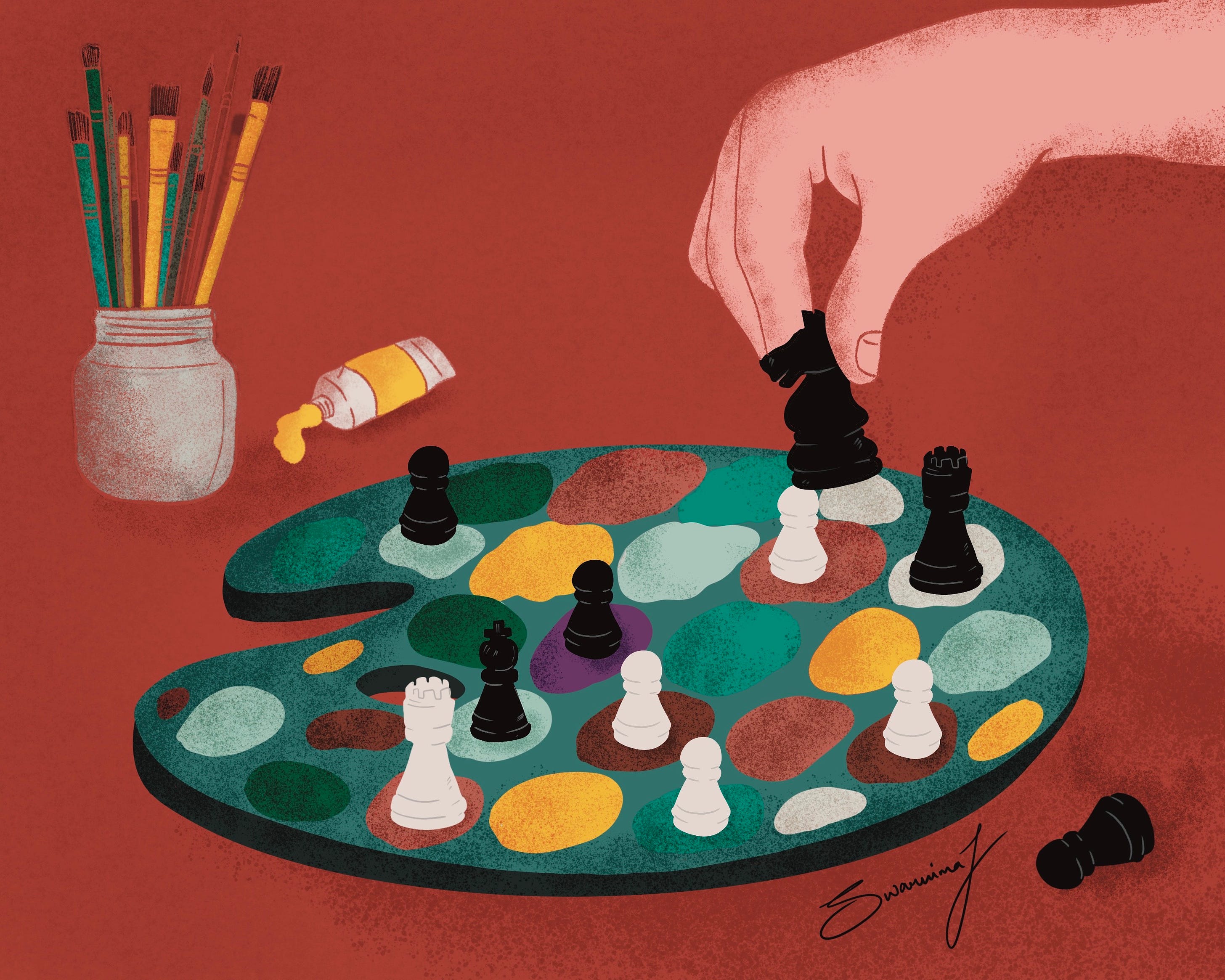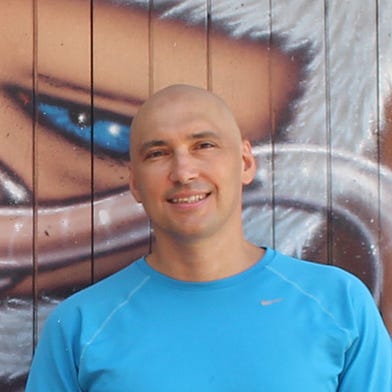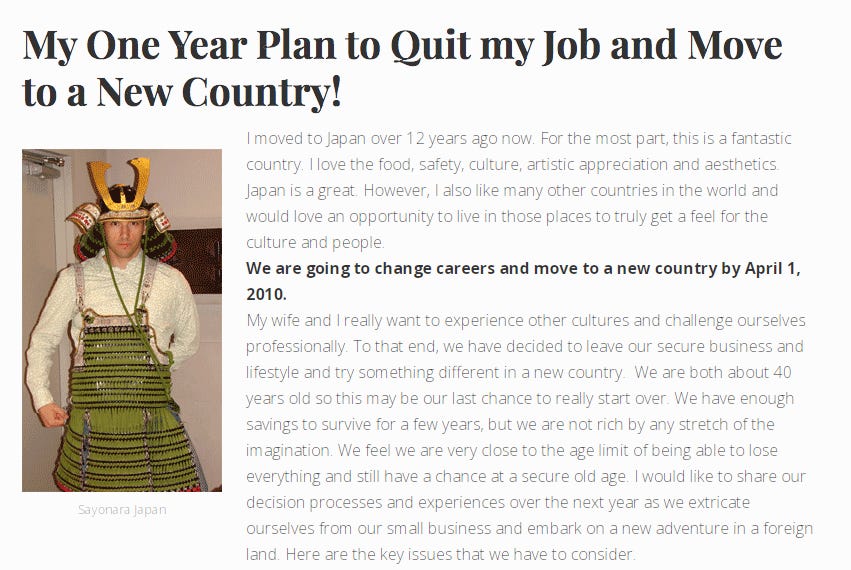What it really means to be a creator and to 'play the creator game'
A newsletter for high achievers who want to ensure their new business is a success, offering tools for clarity, confidence and focus. From certified coach, Ellen and Founder of The Ask®. What it really means to be a creator and to 'play the creator game'Part 1/3 on creators and online business, ft. guest expert and creator John Bardos, IdeaEconomy.Before we get into today’s post a message goes out to those affected by the excruciating events happening in Ukraine. At The Ask we send our thoughts and prayers and donations for the country’s population, made via the Red Cross. To be or not to be… a creator.Being a creator is a topic of interest to many, given that the ‘creator economy’ has become one of the biggest trends in business for a long time, accelerated exponentially by the pandemic and web 3.0. Today’s younger generation are 3x more likely to want to be a YouTuber than an astronaut. Our guest for this post has not jumped on the bandwagon in recent times, however. John Bardos, in one of my favourite conversations for this newsletter to date, shared with me his ‘creator’ journey since 2010 — before that term even existed. My interview with John explores some of the shifts in the last decade in this space, his take on playing the ‘creator game’ and what this means for readers. I’ve been thinking about this topic a lot lately. Through research and speaking to people, I’m building up a perspective on what makes being a creator so appealing and importantly, how it distinguishes from other entrepreneurial career paths. If you’re new here, entrepreneurial career paths are my jam, as a biz coach, founder and newsletter writer. To begin sharing my learnings with you, I bring you today’s post which is one of three in the next three weeks. (Yep, a bonus post).
Subscribe for all three posts and join 1200+ early stage founders and creators. John Bardos is a player of the ‘creator game’John tells me about the ‘creator game’ which is what he calls ‘playing long term games with long term people’. More of his take on the creator game can be found here. He believes that creating an audience can help build your business and bring new opportunities to you. But importantly, John says that you never know what opportunities will arise, it is only if you have a track record of success that things will evolve. “People who do things get opportunities” — you have to do things online if you want people to find you. John breaks the ‘creator game’ down into four components:
Find John on his Twitter and Newsletter.John became a creator in 2010John is best known for his popular weekly newsletter ideaeconomy.net but his own creator story began when he decided to sell his company, house and possessions and become a digital nomad with his wife. In 2009 he made the public commitment to do so via his blog, Jet Set Citizen. At this time, becoming a digital nomad was in vogue albeit very early. Books like Tim Ferris’s 4 Hour Work Week were flying off the shelves and John was one of the few people to actually enact such a drastic lifestyle change. The nomadic life decision was timed with selling his business (an English school in Japan) and to travel the world with his wife. Here’s the post in 2009 where John announces how at 40 years old “this may be the last chance have to start over”. They’ve spent the last 12 years travelling, now with their seven year old son, currently in Montreal. John spends his days on the IdeaEconomy newsletter, which is he started 18 months ago to curate information about online entrepreneurship, startups and creators and his business Bundlesforgood, which sells bundles of creator’s courses and donates 25% of profits to charity. What were the early days like of blogging as a nomad, did this make you money?The blog made me a small amount of money, via sponsored posts and backlinks, but money was not our main priority after selling the English language school we had that and our savings. Was it easier to run a successful blog in those days?We had about 300-500 visitors per day on average, which would probably be harder to come by today, but in no way was I that early to the blogging space. It was the people who started in 2007-8 who were in a wide open market with real advantages. By 2010 the space was more saturated and you still needed to write great content and get backlinks to do well. I wish I had the knowledge that I do now back then, I’d have done very well. So the blog helped you commit to taking the leap to the nomadic lifestyle. When it didn’t bring in much income, what was your motivation to keep it running all those years?It was about connecting with people which I believe is an undervalued part of doing online work online. The creator game is an opportunity engine, I ran meet ups for others creating content online with people who are now lifelong friends. Without this public facing content so many things wouldn’t have happened for me. People find me and I find them. Today this is a critical part of working and living in a post-covid world where it is so hard to make in person connections. I’d meet these people in person during our travels to different locations. For example Chiang Mai in Thailand is a big digital nomad hub now and was back then too, if you were into travel, or SEO or even online gambling. Lots of events were happening there and I’d hold my own meet ups for travel bloggers. These meet ups were so powerful because we were all early in the journey. People like Nomadic Matt, at the time we were all at the same level, building connections together, but now he’s a multi-million dollar blogger. What professional benefits did you see at this time?There was so much much skill development because if you’re working online you have to know about SEO, development, design etc. These became transferrable skills to a business I was running for four years in marketing. Any business with an online presence can benefit from the skills of the online game. Whether that’s creating backlinks to your content, or connecting with others in the space. To me the creator game is about connecting people rather than seeing them as competitors — I believe that things get reciprocated over time and a rising tide raises all ships. What are the main shifts and changes you’ve seen in this space in the last decade?Well the name has changed: ‘creator economy’ is new as a term but people publishing content online is not new. I registered the domain ‘idea economy’ for my blog in 1998 - 24 years ago! I wanted the creator economy to be called the idea economy. So what I’ve seen is that some terminology ends up winning, and the absolute key is to be able to own the terminology. The people who have done this well for example we mentioned Tim Ferriss’ 4 Hour Work Week, and there’s also Seth Godin’s ‘The Dip’ or David Perell’s ‘Personal Monopoly’. [Side note to readers — It’s so true; I’ve even talked about each of these books and concepts in this newsletter before: Tim Ferris, Seth Godin and David Perell]. If you can coin a term and make that a conversation topic, that is a driver to make people think in a different way. So finding ways to describe things is really powerful. Whilst creator economy is a new term, it is describing something that has been around for ages, but terms like ‘blogger/vlogger’ were clumsy. Creator, however is a term that people can really rally around. So whilst the overall concept or publishing online has been around for a long time, today we collect money differently for example via donations and tips for creators. Or whole new platforms exist to for a creator to build a career on, like TikTok. So if a reader thinks they might have one of these terms to coin, what should they do tactically?Branding is not just what you call yourself but about how others’ perceive you. You have to win and be successful with this idea. So we only talk about the ‘4 hour work week’ because Tim Ferris was so popular. To win requires combining a good idea with effective promotion so that it can get popular. I think of Jack Butcher being incredible at this, with his ‘Visualise Value’ conceptYes Jack Butcher was unique, but he was almost unknown until Naval Ravikant started sharing his content and he skyrocketed. It had to be promoted well, which shows you have to master both ends of the spectrum. Let’s talk about newsletters since we both run one. Why do you think newsletters are so popular right now?It is a trendy idea now and Substack has made it possible to move into this space and make money quickly and so a lot of people have jumped on the trend because the business model now exists to get paid, for example the paid subscriptions side of Substack. Bringing high profile journalists across to write for Substack everyone’s attention. But newsletters are nothing new — it is a blog with a sign up form and that’s been around a long time. What is new is our perception of it being trendy. Plus the ease of access and entry into the creator space: you can show up and don’t have to show your face if you don’t want to. Plus it can be really short. Curated content for example doesn’t even require being a great writer. So I’d say Substack definitely changed the newsletter game. Pssst! Do you love learning from newsletters?! Refined shares links from across 10k+ sources to make you smarter every day. Sign up for free here. Whats your main win from running the IdeaEconomy newsletter?It’s being known and connecting with other people online. You contacted me last year about doing an interview from the newsletter, you were the first but since then I’ve had at least five requests, and been mentioned in many other newsletters, which is creating backlinks for my content. It’s a flywheel for content that keeps getting bigger. What makes IdeaEconomy unique?I offer the things you need to level up in the creator game, I share a lot of unique links and these are recent links compared to other curators who might share two years old stuff, I will only share what I found in the last week. It’s current, actionable content to level up your creator game. For the independent creator in the trenches it provides ideas which are insightful and powerful. SIGN UP TO IDEAECONOMY FOR FREE HERE.. you won’t regret it. The creator game is specific to creators and not other types of business owners like startup founders, though. …… John and I then talk about the distinction between being a creator and startup founder, and I will be sharing that conversation next week along with my own take because quite frankly it deserves special attention. The nuances are so important to ensure you are making strategic business decisions AND building the right entrepreneurial career path for you uniquely. I can’t wait to share that with you. In the meantime, if you want to go further on this topic have a read of Packy McCormick’s post on ‘The Great Online Game’. He likens creating on the internet to video games which have levels, contextual rules, rabbit holes and how these ‘rack up points, skills, and attributes that players can apply across their digital and physical lives’. Packy describes how who who are internet-native and play the ‘Game’ can cash out internet points for things like ‘TV shows, Grammy-winning records, venture funds, companies, and political victories’. I wrote about Packy’s impressive journey to monetisation in a previous newsletter here. Thank you for reading as always!If you’re not subscribed yet do so here.Ellen Donnelly, Founder + Chief Coach, The Ask. |
Older messages
How to overcome your fear of sharing your new business in public
Wednesday, February 16, 2022
If no one knows about your business you won't be able to grow. But many experience fears when it comes to sharing. Learn how to move past them, ft. Alessandra Scicchitano
How to get your first 1,000 email subscribers
Wednesday, February 2, 2022
A deep dive into the strategy, tools and tactics used to grow this newsletter to 1000 subscribers on Substack in 2021.
You are on the right path to make your business a reality, welcome!
Thursday, January 20, 2022
Thank you for subscribing to The Ask.
How to use your heart to set goals you truly care about achieving.
Thursday, January 20, 2022
Follow these four steps to setting goals that light you up, plus what you can expect from me, The Ask® and this newsletter in the year ahead.
How to detect the real problem in your business so that you can solve it effectively
Thursday, January 20, 2022
Entrepreneurs face problems that need solving on a daily basis. Knowing exactly what your problem is however, may be the hardest part of the puzzle to solve.
You Might Also Like
What’s Ola Hiding?
Wednesday, March 19, 2025
+ Even big companies such as Hindustan Aeronautics Limited (HAL) are falling for cyber fraud. Meanwhile, Mumbai airport plans tariff hikes that could make flying out of the city more expensive.
Join Jason Lemkin and Sam Blond for Workshop Wednesday!
Tuesday, March 18, 2025
LIVE Wednesday, March 18th at 10AM To view this email as a web page, click here workshop wednesday Live TODAY Hey SaaStr Fans, SaaStr Workshop Wednesdays is back again tomorrow and we've got an
😬Weeping and gnashing of teeth
Tuesday, March 18, 2025
Our paid ads team tests a Reddit strategy View in browser Masters In Marketing In a seismic time for SEO marketing, an unlikely winner emerged last year: Reddit. And while nobody seems happy about that
🤯 Get your business up and running faster with AI
Tuesday, March 18, 2025
Discover the AI tools you should start using. ͏ ͏ ͏ ͏ ͏ ͏ ͏ ͏ ͏ ͏ ͏ ͏ ͏ ͏ ͏ ͏ ͏ ͏ ͏ ͏ ͏ ͏ ͏ ͏ ͏ ͏ ͏ ͏ ͏ ͏ ͏ ͏ ͏ ͏ ͏ ͏ ͏ ͏ ͏ ͏ ͏ ͏ ͏ ͏ ͏ ͏ ͏ ͏ ͏ ͏ ͏ ͏
Only 3 spots!
Tuesday, March 18, 2025
Agency owners have been asking for this for a long time ͏ ͏ ͏ ͏ ͏ ͏ ͏ ͏ ͏ ͏ ͏ ͏ ͏ ͏ ͏ ͏ ͏ ͏ ͏ ͏ ͏ ͏ ͏ ͏ ͏ ͏ ͏ ͏ ͏ ͏ ͏ ͏ ͏ ͏ ͏ ͏ ͏ ͏ ͏ ͏ ͏ ͏ ͏ ͏ ͏ ͏ ͏ ͏
$164,449 In 15 Days (His side-income SECRET)
Tuesday, March 18, 2025
5-step action-plan to build a brand-new "side-income" View in browser ClickBank Hi there, This Friday (21st March) a top ClickBank client is running an online Strategy Lab where he'll
Canadian Ecom Seller? A New Course Just for You
Tuesday, March 18, 2025
How independent agencies are staying ahead of the curve
Tuesday, March 18, 2025
Elevating growth amid surging demand for digital media
It's time to bet on emerging platforms
Tuesday, March 18, 2025
Tips to keep your brand adaptable and embrace change ͏ ͏ ͏ ͏ ͏ ͏ ͏ ͏ ͏ ͏ ͏ ͏ ͏ ͏ ͏ ͏ ͏ ͏ ͏ ͏ ͏ ͏ ͏ ͏ ͏ ͏ ͏ ͏ ͏ ͏ ͏ ͏ ͏ ͏ ͏ ͏ ͏ ͏ ͏ ͏ ͏ ͏ ͏ ͏ ͏ ͏ ͏ ͏ ͏ ͏ ͏ ͏ ͏ ͏ ͏ ͏ ͏ ͏ ͏ ͏ ͏ ͏ ͏ ͏ ͏ ͏ ͏ ͏ ͏ ͏ ͏ ͏ ͏ ͏
Elon vs. Sora
Tuesday, March 18, 2025
Google's Veo 2 is in the race too!





